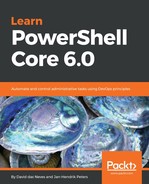All SCCM logs have the same pattern, which makes log file parsing, but also creation, very easy. The following Write-CMLogEntry function creates log files with this specific type:
function Write-CMLogEntry
{
<#
.Synopsis
Logs the entry in an CMTrace-compatible format to an logpath.
.EXAMPLE
Write-CMLogEntry -Value 'Example' -Severity 2 -LogFilePath $LogFilePath
.EXAMPLE
$TSEnvironment = New-Object -ComObject Microsoft.SMS.TSEnvironment -ErrorAction Stop
$LogFilePath = Join-Path -Path $Script:TSEnvironment.Value('_SMSTSLogPath') -ChildPath $FileName
Write-CMLogEntry -Value 'ExampleWithLogFilePath' -Severity 1 -LogFilePath $LogFilePath
.EXAMPLE
Begin {
# Construct TSEnvironment object
try
{
$TSEnvironment = New-Object -ComObject Microsoft.SMS.TSEnvironment -ErrorAction Stop
}
catch
{
Write-Warning -Message 'Unable to construct Microsoft.SMS.TSEnvironment object'
exit 1
}
$Filename = 'LogFile.log'
# Determine log file location
$LogFilePath = Join-Path -Path $Script:TSEnvironment.Value('_SMSTSLogPath') -ChildPath $FileName
}
Process {
Write-CMLogEntry -Value 'ExampleWithLogFilePath' -Severity 3 -LogFilePath $LogFilePath
}
#>
param(
[parameter(Mandatory = $true, HelpMessage = 'Value added to the logfile.')]
[ValidateNotNullOrEmpty()]
[string]$Value,
[parameter(Mandatory = $true, HelpMessage = 'Severity for the log entry. 1 for Informational, 2 for Warning and 3 for Error.')]
[ValidateNotNullOrEmpty()]
[ValidateSet('1', '2', '3')]
[string]$Severity,
[parameter(Mandatory = $true, HelpMessage = 'Name of the log file that the entry will written to.')]
[ValidateNotNullOrEmpty()]
[string]$LogFilePath
)
Process {
# Construct time stamp for log entry
$Time = -join @((Get-Date -Format 'HH:mm:ss.fff'), '+', (Get-WmiObject -Class Win32_TimeZone | Select-Object -ExpandProperty Bias))
# Construct date for log entry
$Date = (Get-Date -Format 'MM-dd-yyyy')
# Construct context for log entry
$Context = $([System.Security.Principal.WindowsIdentity]::GetCurrent().Name)
# Construct final log entry
$LogText = "<![LOG[$($Value)]LOG]!><time=""$($Time)"" date=""$($Date)"" component=""DynamicApplicationsList"" context=""$($Context)"" type=""$($Severity)"" thread=""$($PID)"" file="""">"
# Add value to log file
try
{
Add-Content -Value $LogText -LiteralPath $LogFilePath -ErrorAction Stop
}
catch
{
Write-Warning -Message "Unable to append log entry to logfile: $LogFilePath"
}
}}
These log files can easily be viewed with the CMTrace tool, which comes with the SCCM as well:

A good tooling reference list can be found in the following blog post:
https://blogs.msdn.microsoft.com/daviddasneves/2017/10/15/some-tools-of-a-pfe/
https://blogs.msdn.microsoft.com/daviddasneves/2017/10/15/some-tools-of-a-pfe/
For parsing SCCM log files with PowerShell, you can have a look at the code of the LogFileParser, which uses a RegEx statement to parse all the different log file types (https://github.com/ddneves/LogFileParser):
#SCCM
$newClass = [LogFileTypeClass]::new()
$newClass.LogFileType = 'SCCM'
$newClass.Description = 'All SCCM log-files.'
$newClass.RegExString = '<![LOG[(?<Entry>.*)]LOG]!><time="(?<Time>.*).d{3}-d{3}"s+date="(?<Date>.*)"s+component="(?<Component>.*)"s+context="(?<Context>.*)"s+type="(?<Type>.*)"s+thread="(?<Thread>.*)"s+file="(?<File>.*):(?<CodeLine>d*)">'
$newClass.LogFiles = 'default'
$newClass.LocationsLogFiles = ('c:windowsccmlogs*', 'c:Program FilesSystem Center Configuration Manager*')
($this.LoadedClasses).Add($newClass)
